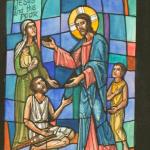
We need to recognize our frailty. While it is possible to become perfect through grace, and so to transcend our sins, even when we have done so, we will have to acknowledge what we have done in the past, that is, the influence sin has had on our lives, and the way we have hurt others and ourselves through our sins. If we don’t do that, it will only mean we are not yet perfect, because we will not be honest with ourselves, with pride being the likely cause. Thus, “If we say we have no sin, we deceive ourselves, and the truth is not in us. If we confess our sins, he is faithful and just, and will forgive our sins and cleanse us from all unrighteousness. If we say we have not sinned, we make him a liar, and his word is not in us” (1 Jn. 1:8-10 RSV).
Grace perfects nature, and so it can and does lead us to perfection. Nonetheless, grace requires our cooperation for it to bring us to such perfection. And though we will often cooperate with it to a limited extent, that is, when we look for forgiveness for what we have done, and so receive grace, we should realize having obtained forgiveness is not in itself the same thing as having becoming perfect. Such perfection is found only at the completion of our salvation, when we transcend sin, so that it can be said we go and truly sin no more. Thus, until we are truly perfect, we will need to work out our salvation, constantly embracing grace so that it can help us change our ways. We will need to build up good habits, those which lead to virtuous conduct, even as we will have to fight against our bad habits or vices which lead us astray. So long as we find ourselves falling into sin, we need to accept our spiritual condition, that is, that we are spiritually sick and that our cooperation with grace is similar to following the prescription a doctor gives us to become physically healed. We should not pretend to be something which we are not. When we find ourselves falling into temptation again and again, and finding such temptation getting the best of us, we should not represent ourselves as being holy. We certainly should not pretend to be holy in front of others, and then sin in private, for such deception itself will only encourage us not only to sin, but to sin gravely. It is better to be open with others, to even sin in front of them, than to pretend to be perfect and sin only in secret, as St. Jerome wrote: “And when we compare two evils, it is a lesser evil to sin openly than to pretend and fake holiness.”[1]
If we desire to appear to be holy when we are not, we find that in the end, we end up believing the lie ourselves. We ignore our grave faults, among which is pride, and engage the world, thinking we deserve every accolade, every praise we get. We find ourselves trapped in a cycle of self-deification, and in the end, the sin which we ignore, the sin which proves our pretense is a lie, will be exposed. Then we will find our lives, and all we built up for ourselves, will collapse like the Tower of Babel. Indeed, we will likely find ourselves falling deep into our sin, similar to the way Satan is presented to have done. We will not turn away from our sin, but rather, double down on it; then we will become so self-absorbed, we will cut ourselves off from the grace we need to heal and truly become holy.
It is because we have been given freedom that we have this chance to become so self-absorbed, and so, though freedom is a good, it is a good which can be abused. When we sin, that is exactly what we do. The more we sin, the more we find ourselves bound by our choice, controlled and dominated by it. For sin is destructive. It destroys what it touches, and as it comes out of our will, it destroys and dominates it, so that we find our personal agency being taken away from us and we become more and more like a mere object without any personal freedom. At the root of sin is the choice to either will for ourselves, and in doing so, become trapped by ourselves and imperfections, and the evil which is produced by such selfishness, or to will and act for others and God. As Bulgakov explained, therefore, the good given to us, our freedom, comes at a price, that is, with a temptation to abuse it by willing exclusively for ourselves and our own desires. To become holy, we must overcome that desire: “Thus, creatureliness, the union of freedom and givenness, contains the possibility of revolt and self-willfulness, which tempts us under the masks of pretend genius and self-deification. Creatureliness contains luciferism as a temptation that is to be overcome.”[2]
We need to overcome ourselves, that is, we need to stop looking out for our own individual interests, if we are to be perfect. Only by opening ourselves up so that we do not think only about ourselves and our own selfish interest will this be possible. Indeed, we must learn to rely upon others and their help, even as we grace, which comes from God and not ourselves, if we are to overcome spiritual delusion and the hinderances it brings to our salvation. The more spiritual we are, the more, not less, we need others, for the greater we have become, the more potential we have for a great fall. Great sinners can turn into great saints, but would-be saints can also turn into great sinners. “When a sick person, out of contempt for others, tries to cure himself, he falls into destruction. He should seek an experienced physician who can provide a remedy for his illness.” [3] The more we think we can heal ourselves, the more deluded we become, and so the more we will do those things which will end up leaving us spiritually desolate. This is not to say everything we choose to do will harm us, indeed, the fact is, much of what we do, on some level, will do us some good, but that will end up reinforcing the false view that we can continue ignoring the wisdom, advice, and help of others, setting us up for the great fall which is to come.
Arrogant boastfulness, selfishness, pride, all come from the same root, from the falsely conceived self, the ego, which serves as the foundation of our activity. We will not be able to vanquish that false self and the ego which emerges from it without help. That help will come from someone else who, having undergone a similar struggle, found the right way to cooperate with grace and receive the help they needed:
Remember, too, that an ordinary road is infested with thieves and robbers, so that one cannot travel along it without an escort. As for the mystic Way, the world, one’s ego, devils, men, and jinn all infest this Way, thus making it impossible to travel along it without an experienced, holy man as one’s escort. [4]
To be sure, such a person can only serve as an escort. We have to follow after them, and do what they recommend. That is, a part of the struggle will always be left to ourselves. We have to work out our own salvation. We have to cooperate with grace to become perfected by it. We can’t do it alone. Others will show us the kinds of pitfalls which lie before us and the way to overcome them. If we don’t heed them, we will likely fall into them. But if we do fall into them, we will have the opportunity to change our ways, to accept help from others, and so reach out and accept the hand which is given us to get back up and back on our way, making sure we find ourselves on the path to salvation. We can’t do that by ourselves. We are not meant to do so. We are not meant to do it alone. The more we try to do all things by ourselves, thinking we don’t need others, we reinforce the false self and its ego, making sure we never find our way out of the minefield which lie before us. This is why those who have no experiencing transcending the false self, must never just move away from the world thinking they can do it all by themselves. They might try all kinds of things to deal with it, taking all kinds of extreme measures, like fasting, to die to the self, only to find their actions reinforce that false self:
Where such lack of moderation prevails, the ethereal virtues (that is, humility and the beautiful flowers of love) perish, because immoderate abstinence lacks the viridity of the virtues. For immoderate abstinence breeds in an arrogant boastfulness, which has no foundation; and, besides, it produces many terrors, which appear to be holy, but are not.[5]
Listening to others will help make sure we do not try some extreme method to dealing with the ego which only ends up reinforcing it. Embracing some particular virtues, without embracing a proper balance and knowing the way forward, usually leads to pride, undermining our perfection. And so, in the end, we truly must recognize our frailty, and our need to get help from others. This will keep us humble, and such humility will lead to our salvation That is why it is the only way true forward.
[1] St. Jerome, Commentary on Isaiah in St Jerome: Commentary on Isaiah; Origen Homilies 1-9 on Isaiah. Trans. Thomas P. Scheck (New York: Paulist Press, 2015), 334.
[2] Sergius Bulgakov, Bride of the Lamb. Trans. Boris Jakim (Grand Rapids, MI: William B. Eerdmans Publishing Company, 2002), 155.
[3] Sharafuddin Maneri, The Hundred Letters. Trans. Paul Jackson, SJ (New York: Paulist Press, 1980), 36 [Letter 7].
[4] Sharafuddin Maneri, The Hundred Letters, 26. [Letter 5].
[5] St. Hildegard of Bingen, “Letter 234” in The Letters of Hildegard of Bingen. Volume III. Trans. Joseph L Baird and Radd K Ehrman (Oxford: Oxford University Press, 2004), 33.
Stay in touch! Like A Little Bit of Nothing on Facebook.
If you liked what you read, please consider sharing it with your friends and family!
N.B.: While I read comments to moderate them, I rarely respond to them. If I don’t respond to your comment directly, don’t assume I am unthankful for it. I appreciate it. But I want readers to feel free to ask questions, and hopefully, dialogue with each other. I have shared what I wanted to say, though some responses will get a brief reply by me, or, if I find it interesting and something I can engage fully, as the foundation for another post. I have had many posts inspired or improved upon thanks to my readers.












